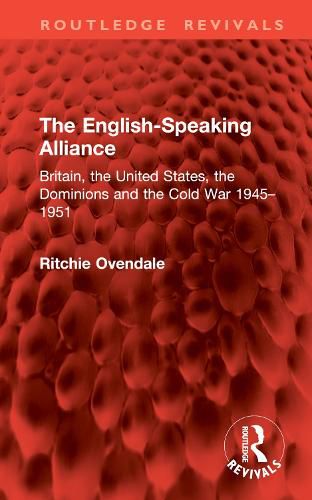Readings Newsletter
Become a Readings Member to make your shopping experience even easier.
Sign in or sign up for free!
You’re not far away from qualifying for FREE standard shipping within Australia
You’ve qualified for FREE standard shipping within Australia
The cart is loading…






As with 'appeasement', myths and legends have proliferated about the origins of the Cold War. It has often been treated as largely a European affair, with the responses to the Russian threat being led by the Americans. Before 1951, however, the Cold War was almost global in scale, extending across Europe and Asia, penetrating the Middle East and Africa. It was the British Foreign Secretary Ernest Bevin who was the principal architect of the Western alliance formed to counter the perceived menace. Bevin organized Europe in preparation for the Marshall Plan, initiated the Western Union and the North Atlantic Treaty Organization, but his vision was wider. Like Neville Chamberlain in the late 1930s, Bevin outlined a plan for an 'English-speaking defence alliance'. The French were defeatist, and it was politically impossible to propose reliance on Germany for defence. What was needed was a bond between Britain, the United States and the old 'white' Dominions.
First published in 1985, The English-Speaking Alliance is the story of how the post-war Labour governments sustained the image of Britain as a world power and laid the foundations of the West's Cold War foreign policy. It is told from sources in the British, American and Australian archives, some of which have been used for the first time.
By laying bare the mechanics of the process of alliance building, Ritchie Ovendale offers many new insights which challenge the orthodox view of this crucial period of international politics. As such it will appeal to anyone with an interest in world politics and a desire to know more about how the current superpower regime developed.
$9.00 standard shipping within Australia
FREE standard shipping within Australia for orders over $100.00
Express & International shipping calculated at checkout
As with 'appeasement', myths and legends have proliferated about the origins of the Cold War. It has often been treated as largely a European affair, with the responses to the Russian threat being led by the Americans. Before 1951, however, the Cold War was almost global in scale, extending across Europe and Asia, penetrating the Middle East and Africa. It was the British Foreign Secretary Ernest Bevin who was the principal architect of the Western alliance formed to counter the perceived menace. Bevin organized Europe in preparation for the Marshall Plan, initiated the Western Union and the North Atlantic Treaty Organization, but his vision was wider. Like Neville Chamberlain in the late 1930s, Bevin outlined a plan for an 'English-speaking defence alliance'. The French were defeatist, and it was politically impossible to propose reliance on Germany for defence. What was needed was a bond between Britain, the United States and the old 'white' Dominions.
First published in 1985, The English-Speaking Alliance is the story of how the post-war Labour governments sustained the image of Britain as a world power and laid the foundations of the West's Cold War foreign policy. It is told from sources in the British, American and Australian archives, some of which have been used for the first time.
By laying bare the mechanics of the process of alliance building, Ritchie Ovendale offers many new insights which challenge the orthodox view of this crucial period of international politics. As such it will appeal to anyone with an interest in world politics and a desire to know more about how the current superpower regime developed.